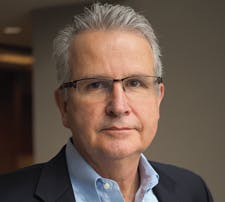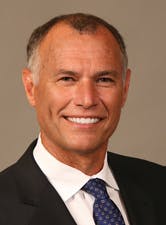Executive Roundtable: On the value of DSOs
Three DSO executives answer the same question but offer different perspectives
QUESTION: What makes DSOs valuable?
R. J. Adolfi, founder and managing director of DentalSense:
Amazing as it seems, dentists complete four years of dental school amassing as much as (and sometimes more than) $300,000 in student loans to become licensed . . . but they are not required to take a single business class.
In the 1970s, the DSO industry was born of an idea to "divide and conquer." Dentists realized that with the right support team, they would be able to concentrate on providing quality dental care for their patients, and their practices would thrive. While a DSO can be a valuable asset to a dental practice, it is vital that business is not mixed with dentistry.
Over the years, DSOs have notoriously "crossed the line" between the hallway and the operatory. Many DSOs believe that the dentists should give up both financial and clinical control to promote the "business" part of their practice. Specifying time allotments and instituting production-based compensation is unethical. Dictating how a dentist should diagnose and plan treatments is unequivocally unethical. The control of a patient's dental health should always be left to the licensed dentist without interference from the practice's "business" department.
Some DSOs imply that the dentist has to be "a team player." This is a huge mistake. The dentist is the owner and, more importantly, the coach of the team. The auxiliary staff should do whatever it takes to enhance the doctor-patient relationship and the hygienist-patient relationship. They should provide the clearest possible picture to the dentist, enabling them to focus on providing the best care for the patients.
A good DSO should provide the dentist and the key staff members with a clear and concise summary of factors that affect the practice's sustainability. In fact, there are six key indicators that should be available to the dentist on a "daily dashboard." These indicators will enable the dentist to remain abreast of the financial health of the practice and focus fully on the dental health of the patients.
Business methods can help a dental practice stay in "business," but dentistry cannot be managed in the same way. Performing dental procedures has nothing to do with business, and business people have not been trained in dental procedures. Dentists who truly understand this concept will be successful, and their patients will be much happier with their experiences.
The most important question to any member of your team-including DSO staff-must be, "What is in the best interest of the patient's dental health?" If at any time you feel that this question is not top-of-mind with a person involved in your practice, it's time to reconsider that relationship.
R. J. Adolfi is the founder of DentalSmart and DentalSense, and he is also one of the individuals responsible for developing Upstate Dental Health Services PC, the first "dental super practice"-known today as Aspen Dental. Upon his retirement from professional hockey, R. J. was called to run the overall operations of the family business, which then consisted of dozens of practices throughout the Northeast. Now, he brings this expertise to dentists across the country through DentalSense, which provides dentists 100% ownership, with the advantages of corporate dentistry yet no interference in clinical care.
Tom Nance, CEO of Benevis:
"Dental service organization": It's a buzzword that has rocked the dental industry in recent years, transformed the way many dentists do business, and sparked prolific commentary with regard to its impact on the profession.
In my role as CEO for one such dental service organization, I've talked with hundreds of our affiliate dentists about why they decided to partner with a DSO and what they like about it. Some common refrains I hear:
· "Affiliating with a DSO has helped me strike a better work-life balance."
· "It has helped me realize my dream of doing meaningful work and helping those who need it most."
· "I can focus my time and attention on what I spent all those years (and money) training to do: being a dentist."
Most dentists are not trained in administrative work like accounting, human resources, or payroll-nor do they particularly enjoy it. Yet owning a successful dental office requires mastery of all these things. Partnering with a DSO gives dentists the best of all worlds: it removes all the administrative headaches, it allows dentists to focus on their patients, and it lets dentists grow as practitioners.
Our affiliate dentists are not the only ones singing the praises of DSOs. According to health-care advocates such as the National Minority Quality Forum (NMQF) and National Hispanic Medical Association (NHMA), the DSO model has played an important role in increasing access to dental care among historically underserved populations. Indeed, most of the Medicaid dental coverage gains seen since 2000 can be attributed to the emergence of DSO-supported practices. In Texas, DSOs cover at least 30% of Medicaid beneficiaries. In Virginia, DSOs provide a dental home to 32% of Medicaid enrollees, according to a recent NHMA report.1
Increased efficiencies, including assistance with complicated Medicaid filings and the ability to accept lower reimbursement rates, allow DSO-affiliated dentists to provide more cost-effective care to a larger proportion of Medicaid beneficiaries, which means reduced costs to the system. One study in Texas found that DSOs, on average, charged 32% less per patient per year than non-DSO dentists.2 This is likely an effect of more robust compliance and auditing programs within DSOs, as well as prevention-focused treatment plans that lead to the improved oral health of patients who have found a dental home with DSO-affiliated practices.
In summary, DSOs are revolutionizing the way dental care is delivered. I, for one, am proud to be part of the shift toward modernizing dental care delivery in America.
Tom Nance has more than 35 years of experience in the health care, consumer products, and business services industries. He joined Benevis as CFO in 2005 and was appointed CEO in 2013. He was formerly CFO of Elmer's Products Inc., a Kohlberg Kravis and Roberts (KKR) portfolio company. Previously, he was with Borden Foods, another KKR portfolio company where he held several senior financial positions and was most recently VP of systems/CIO. He is a graduate of the University of Georgia.
References
1. Rios M. Policy brief: An examination of minority populations and the dental service organization model in the United States. National Hispanic Medical Association website. http://www.nhmamd.org/images/Future%20Docs/NHMA%20Oral%20Health%20Delivery%20White%20Paper%208.15.pdf. Published July 2015. Accessed February 2, 2016.
2. Laffer A. Dental service organizations: A comparative review. Pacific Research Institute website. http://www.pacificresearch.org/fileadmin/documents/Studies/PDFs/2012.09.19LafferDSOs.pdf. Published September 19, 2012. Accessed February 2, 2016.
Rick Workman, DMD, founder and active executive chairman of Heartland Dental:
Identifying the support needs of dentists has certainly been one of the main reasons why DSOs have come into existence, but it is not the only reason. DSOs have become more prevalent, in large part, because of the establishment of this new reality: Modern dentists are encountering a multitude of challenges-such as new technology, increased costs, diminishing patient visits, government regulation, legal issues, third-party payment changes, and more.
DSOs help dentists meet these challenges. For new dental school graduates, it's hard to start out in private practice these days. Currently, only 50% of new dental graduates enter private practice upon graduation, according to the ADA. Some dental school graduates are simply unwilling or unable to take out loans in order to finance a new practice on top of already-significant student loans.
Furthermore, the decreasing number of solo practitioners seems to correlate with an increase in group practices. The ADA Health Policy Resources Center has concluded that the rate of solo practitioners is falling.1 In 2010, 69% of dentists were solo practitioners, compared to 76% in 2006.1 By comparison, group practices, many of which are supported by DSOs, increased by 25% between 2009 and 2011.1 I don't think this points to the extinction of the solo practitioner, but I do think-because of the reasons I've discussed and other developing trends-that more and more dentists are turning to DSOs for support.
Meeting the needs of today's dental patients is not as simple as it used to be. Today's "dental consumers" have more options, information, and education at their fingertips than ever before. People can identify hundreds of clinicians online who can provide the service they are searching for at the price they want. As patients are now more knowledgeable and savvy than ever before, it's necessary for dental offices to adapt to their needs. Dental support organizations are equipped to help dentists succeed in these areas by providing support in areas such as marketing, public relations, social media, and communication, for example.
No matter what level of experience you possess, I'm sure you have felt the effects of these new industry trends. Dental support organizations have set themselves up in the industry to be an advantageous option for many who are trying to overcome these challenges.
Rick Workman, DMD, is the founder and active executive chairman of Heartland Dental. After many years of practicing full time, Dr. Workman created Heartland Dental, a world-class dental support organization, offering non-clinical, administrative services to supported dentists and team members. Today, Heartland Dental is the largest dental support organization in the nation, with more than 700 supported dental offices in 32 states. Dr. Workman may be reached at [email protected].
Reference
1. Fox K. ADA explores growth of large group practices. ADANews website. http://www.ada.org/en/publications/ada-news/2012-archive/april/ada-explores-growth-of-large-group-practices. Published April 9, 2012. Accessed March 16, 2016.



